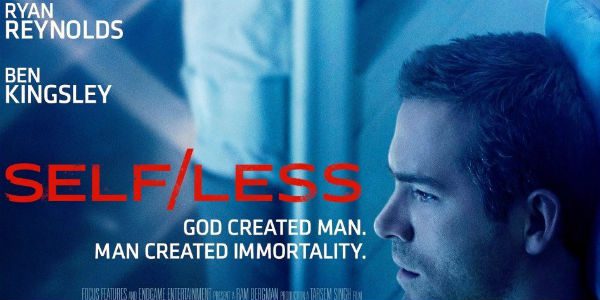This can’t be repeated often enough — preach in a movie, and you’ll lose the vast majority of the unconverted and a good chunk of the converted.
With the possible exception of a slice of the Evangelical audience, people don’t go to movies for a sermon — religious or secular. They want to be entertained and possibly given food for thought. And if that can be achieved with some larger questions about life and morality sneaked in under the radar, all the better.
I had no expectations going into the new feature film “Self/Less,” premiering in theaters today, Friday, July 10, and I was pleasantly surprised. Then, when I went to a junket with the screenwriters and director, I was even more pleasantly surprised.
The poster above might make you think that God is an active element in this movie. Well, He’s not.
When people who are steeped in religious tradition produce a film that’s pro-marriage, pro-family and has a solid moral core, that’s expected. But when it comes from folks who have no overt allegiance to faith, then you know it’s coming from the realm of natural law, and the way God designed us (even if you don’t believe there is a God).
The film focuses on a very wealthy New York tycoon called Damian (Ben Kingsley), who’s estranged from his idealistic-crusader daughter (Michelle Dockery of “Downton Abbey”) and rapidly dying of cancer. Slipped a business card for a mysterious organization called Phoenix Biogenix, which promises him a new lease on life, Damian goes for it.
The company’s CEO (Matthew Goode) promises Damian a spanking-new body (played by Ryan Reynolds), supposedly grown in a lab, into which his consciousness would be placed. There’s a lot of talk about saving “great minds” for the future. The notion of prolonging Steve Jobs’ cancer-shortened life comes up, and that was an inspiration for the screenwriters.
(When Jobs’ name is mentioned, it’s always good to note — and it annoys pro-abortion people to no end when you do this — that Jobs was an unplanned pregnancy that was not aborted but instead brought to term, and the baby given up for adoption. So, this “great mind” could have been sucked out of his mother’s womb and tossed in the trash, and none the wiser — and nobody gets a Mac or an iPhone.)
Damian goes through with the transfer, and after getting used to his new buff thirtysomething body, he’s given a fresh identity and shipped off to New Orleans, where he promptly starts having sex with a string of attractive young women.
But pretty soon, there’s a fly in the ointment. Damian (now going by Eddie) is given pills he must take. But when he misses one, strange images — like memories of another life, with a wife (Natalie Morales) and a daughter — overtake him.
As you might guess, the new body is not so new after all, but a purchase from the previous inhabitant, who was desperate for cash to save his ailing little girl.
Over time, Damian is told these memories fade away, and the body will become completely his.
So, the question arises, will Damian keep this other man’s body, extending his own existence, while abandoning the wife and daughter to their fate?
And of course, Damian isn’t the only one to have gone through this procedure, and not all the bodies purchased were adult males.
At the junket, director Tarsem Singh said he was a basically selfish person who’d been an atheist since the age of nine (although his wife is a believer), and while he wouldn’t take Damian’s path right now, he could see the temptation.
Spanish-born sibling screenwriters David and Alex Pastor were fascinated by the notion of keeping someone like Jobs alive, and the implications of that.
Singh played down the geeky science aspect of the movie. It didn’t interest him, and even though I’m a good SF geek myself, I didn’t mind that. As with any good science fiction, the mechanics are never as important as the deep human questions being asked.
When I mentioned to Singh and the Pastors that one of the great themes of the movie is self-sacrifice — which is, of course, a core Christian value — I wasn’t contradicted, but I did get the sense that, although the movie’s title also indicates a giving of self, that the filmmakers weren’t trying to make a religious statement at all.
Instead, the movie’s impetus comes from honest and natural human feelings — the love of a father for his child, or of a husband for a wife (and the deep familiarity that is the result of marital intimacy).
As we know, these are not born of a particular religious system, but are written by the Creator on the human heart. And, in between action sequences and things blowing up, they’re written on the heart of “Self/Less.”
Image: Courtesy Endgame Entertainment/Focus Features
Don’t miss a thing: head over to my other home at CatholicVote and like my Facebook page.














